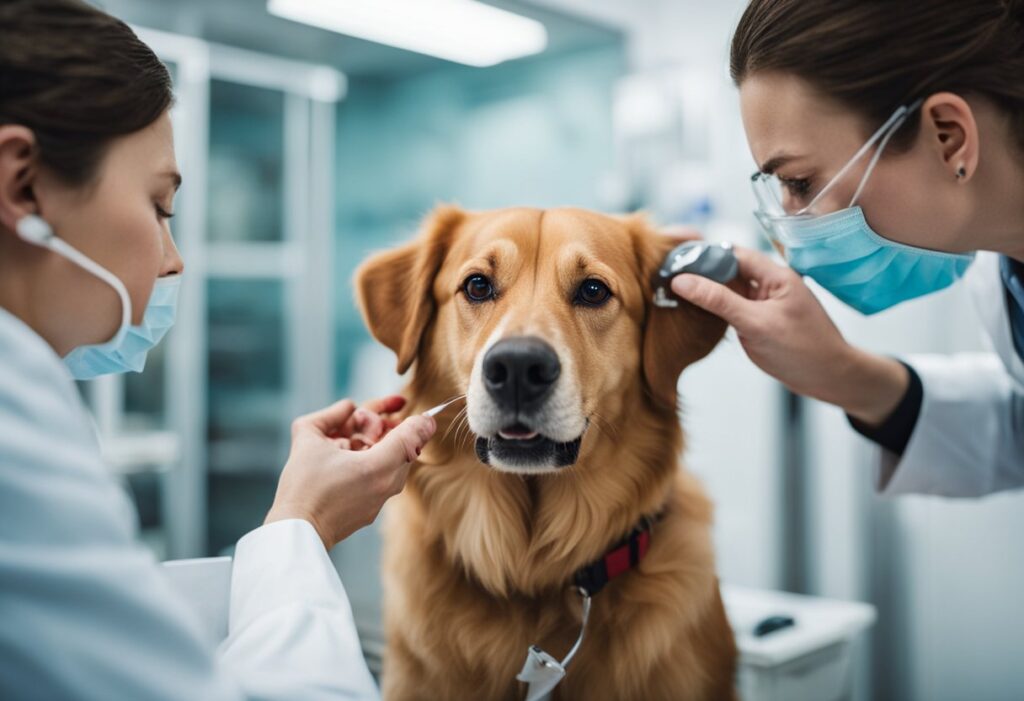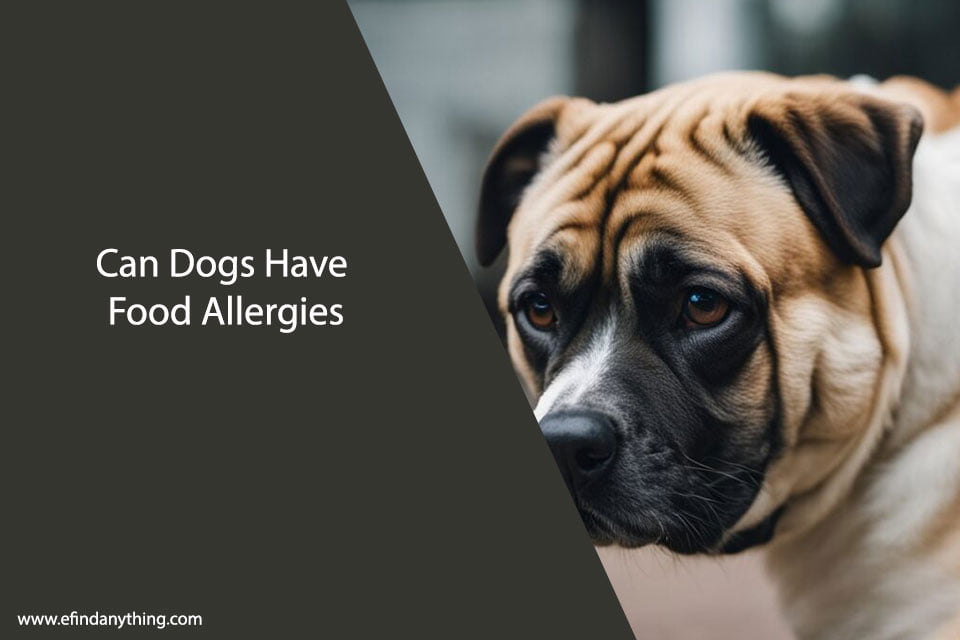Dogs are beloved members of our families, and we want to make sure they are healthy and happy. One concern that many pet owners have is whether their dogs can have food allergies. The answer is yes, just like humans, dogs can have food allergies.

Food allergies occur when a dog’s immune system overreacts to a specific ingredient in their food. Common allergens for dogs include beef, chicken, dairy, eggs, wheat, and soy. Symptoms of food allergies in dogs can range from mild to severe and may include itching, skin rashes, vomiting, and diarrhea. It is important to note that food intolerance and food allergies are not the same thing. Food intolerance involves difficulty digesting a certain food, whereas food allergies involve an immune response.
Table of Contents
Understanding Food Allergies in Dogs

Defining Food Allergies
Food allergies in dogs occur when their immune system reacts negatively to a specific protein in their diet. This reaction can cause a range of symptoms, including vomiting, diarrhea, skin irritation, and itching. In severe cases, food allergies can even lead to anaphylaxis, a life-threatening condition.
Common Allergens in Canine Diets
Several ingredients are commonly associated with food allergies in dogs. These include beef, chicken, dairy, eggs, soy, and wheat. However, any ingredient can trigger an allergic reaction, so it’s important to monitor your dog’s diet closely and seek veterinary advice if you suspect an allergy.
Difference Between Food Allergies and Food Intolerance
It’s important to note that food allergies and food intolerance are not the same thing. Food intolerance refers to a digestive issue that occurs when a dog has difficulty digesting a particular food. This can cause symptoms such as gas, bloating, and diarrhea but does not involve the immune system. In contrast, food allergies involve an immune system response and can cause a wider range of symptoms.
By understanding food allergies in dogs, you can take steps to prevent and manage this condition in your furry friend. If you suspect your dog has a food allergy, consult with your veterinarian to determine the best course of action.
Symptoms of Food Allergies in Dogs

Food allergies in dogs can cause a wide range of symptoms that can be difficult to pinpoint. In this section, we will discuss the most common symptoms of food allergies in dogs.
Skin Irritations
One of the most common symptoms of food allergies in dogs is skin irritations. These can include itching, redness, and rashes. Dogs may also develop hives or hot spots on their skin. In some cases, dogs may even experience hair loss or skin infections as a result of food allergies.
Gastrointestinal Signs
Food allergies can also cause gastrointestinal signs in dogs. These can include vomiting, diarrhea, and excessive gas. Dogs may also experience bloating, abdominal pain, and a loss of appetite. In severe cases, food allergies can lead to dehydration and malnutrition.
Respiratory Issues
In rare cases, food allergies can cause respiratory issues in dogs. These can include coughing, wheezing, and difficulty breathing. Dogs may also experience nasal discharge or sneezing as a result of food allergies.
If you notice any of these symptoms in your dog, it is important to consult with your veterinarian. They can help you determine if your dog has a food allergy and develop a treatment plan to manage their symptoms.
Diagnosing Food Allergies

When a dog is suspected of having a food allergy, a proper diagnosis is necessary to ensure that the dog is receiving the appropriate treatment. There are several methods for diagnosing food allergies in dogs, and each method has its advantages and disadvantages.
Veterinary Examination
The first step in diagnosing a food allergy is to schedule an appointment with a veterinarian. The veterinarian will perform a thorough physical examination and ask about the dog’s medical history, symptoms, and diet. The veterinarian may also perform blood tests and skin tests to rule out other possible causes of the dog’s symptoms.
Elimination Diet Trials
The most reliable method for diagnosing a food allergy in dogs is an elimination diet trial. This involves feeding the dog a diet that contains a single protein source and a single carbohydrate source that the dog has never eaten before. The dog must eat this diet exclusively for a minimum of 8-12 weeks. If the dog’s symptoms improve during this time, it is likely that the dog has a food allergy. The dog can then be gradually reintroduced to other foods to determine which foods trigger an allergic reaction.
Allergy Testing Methods
There are several allergy testing methods available for dogs, including blood tests and intradermal skin tests. However, these tests have limitations and are not always reliable for diagnosing food allergies. Blood tests can detect antibodies to specific allergens, but they do not always correlate with clinical symptoms. Intradermal skin tests involve injecting small amounts of allergens into the dog’s skin to look for a reaction, but they can produce false positives and false negatives.
In conclusion, diagnosing a food allergy in dogs can be challenging, but it is important to determine the underlying cause of the dog’s symptoms to provide the appropriate treatment. A combination of a veterinary examination, elimination diet trial, and allergy testing methods may be necessary to accurately diagnose a food allergy in a dog.
Managing and Treating Canine Food Allergies

When it comes to managing and treating canine food allergies, there are a variety of options available. Here are some of the most effective strategies we recommend:
Dietary Adjustments
The most important step in managing a food allergy in dogs is to identify and eliminate the offending ingredient from their diet. This can be done through an elimination diet, which involves feeding your dog a novel protein and carbohydrate source that they have never eaten before. This can help to identify the specific ingredient causing the allergic reaction.
Once the offending ingredient has been identified, it is important to avoid feeding it to your dog in any form. This may involve switching to a commercial dog food that is free from the allergen, or preparing homemade meals that are tailored to your dog’s specific dietary needs.
Medications and Supplements
In some cases, dietary adjustments may not be enough to manage your dog’s food allergy. In these situations, medications and supplements may be recommended to help alleviate symptoms.
Antihistamines, corticosteroids, and immunosuppressants are all commonly used to manage allergic reactions in dogs. Additionally, supplements such as omega-3 fatty acids and probiotics may be recommended to support your dog’s immune system and overall health.
Long-Term Management Strategies
Managing a food allergy in dogs requires a long-term commitment to their health and wellbeing. This may involve regular check-ups with a veterinarian, ongoing dietary adjustments, and close monitoring of your dog’s symptoms.
It is important to remember that while there is no cure for food allergies in dogs, with the right management strategies in place, your dog can still lead a happy and healthy life. By working closely with your veterinarian and following their recommendations, you can help to minimize the impact of your dog’s food allergy on their quality of life.
Preventing Food Allergies in Dogs

As responsible pet owners, we want to ensure our furry friends are healthy and happy. One way to do this is by preventing food allergies. Here are some tips on how to prevent food allergies in dogs.
Choosing the Right Diet
Selecting the right diet for your dog is crucial in preventing food allergies. It is recommended to choose a diet that is made with high-quality ingredients and is free from artificial preservatives, colors, and flavors. A diet that is rich in protein and contains a variety of fruits and vegetables can help keep your dog healthy and prevent allergies.
Understanding Ingredient Labels
Reading and understanding ingredient labels is essential in preventing food allergies in dogs. Look for foods that have a short list of ingredients and avoid foods that contain common allergens such as corn, wheat, and soy. If your dog has a specific allergy, make sure to avoid any foods that contain that ingredient.
Regular Veterinary Check-Ups
Regular veterinary check-ups can help identify any potential food allergies in your dog. Your vet can help you choose the right diet for your dog and can also perform allergy tests to determine if your dog has any specific allergies. Regular check-ups can also help catch any health issues early on, preventing further complications.
By following these tips, we can help prevent food allergies in our furry friends, keeping them healthy and happy.
Frequently Asked Questions
What are the common symptoms of food allergies in dogs?
Food allergies can cause a range of symptoms in dogs, including itching, scratching, hives, ear infections, diarrhea, vomiting, and even respiratory problems. It’s important to note that these symptoms can also be caused by other conditions, so it’s important to have your dog evaluated by a veterinarian to determine the underlying cause.
Which ingredients should I avoid feeding a dog with skin allergies?
If your dog has skin allergies, it’s important to avoid feeding them ingredients that commonly cause allergic reactions in dogs. Some of the most common culprits include chicken, beef, dairy, soy, wheat, and corn. Instead, look for dog foods that are made with novel protein sources like duck or venison, or limited ingredient diets that contain fewer ingredients overall.
How long does it typically take for a dog’s food allergy symptoms to subside?
The length of time it takes for a dog’s food allergy symptoms to subside can vary depending on the severity of the allergy and the individual dog. In some cases, symptoms may improve within a few days of switching to a hypoallergenic diet, while in other cases it may take several weeks or even months to see improvement.
What are the most common food allergens in dogs?
The most common food allergens in dogs include chicken, beef, dairy, soy, wheat, and corn. However, it’s important to note that any ingredient can potentially cause an allergic reaction in a dog, so it’s important to carefully monitor your dog’s reaction to any new foods or treats.
How can I determine if my dog is allergic to a specific food like chicken?
If you suspect that your dog may be allergic to a specific food, the best way to confirm this is through an elimination diet. This involves feeding your dog a novel protein source and carbohydrate source that they have never eaten before for a period of 8-12 weeks. If your dog’s symptoms improve during this time, you can gradually reintroduce other foods to determine which ones are causing the allergic reaction.
What are the options for treating a dog with severe food allergies?
If your dog has severe food allergies, your veterinarian may recommend a prescription hypoallergenic diet or a home-cooked diet that is tailored to your dog’s specific needs. In some cases, they may also prescribe medications like corticosteroids or antihistamines to help manage your dog’s symptoms. It’s important to work closely with your veterinarian to determine the best course of treatment for your dog.





